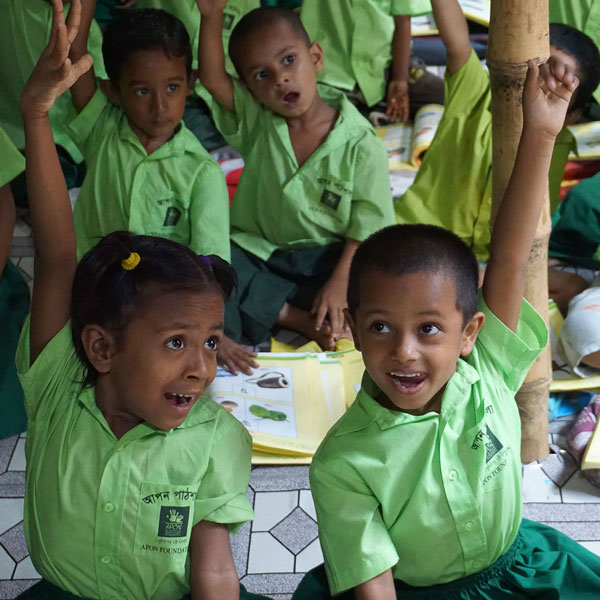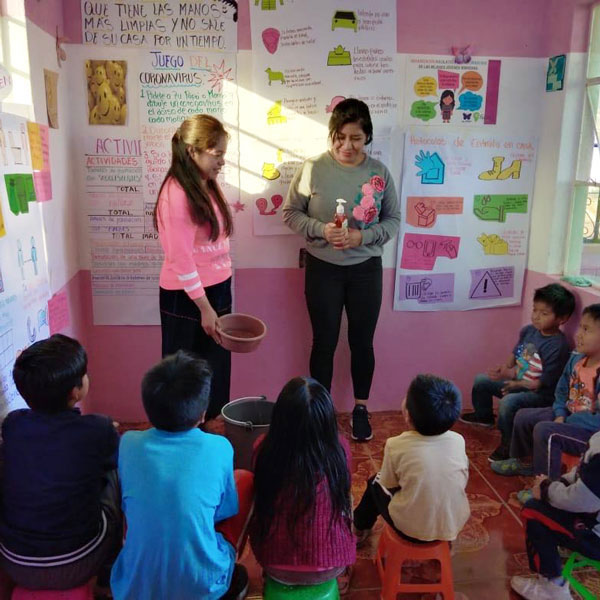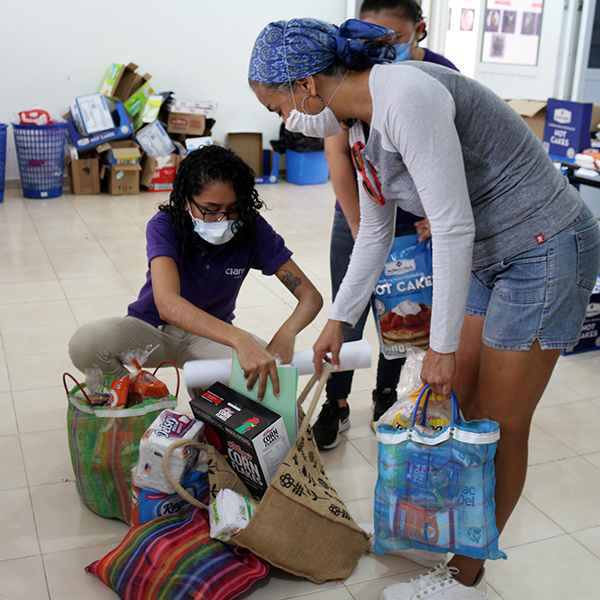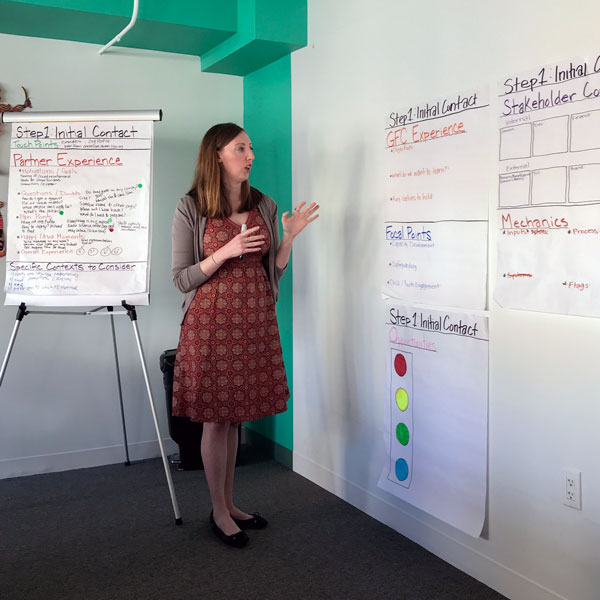This article was originally published on the Council on Foundations’ blog. It was written by Kathy Hall, Kimberly McClain, and Irma González Neri.
The Summit Foundation, GFC, and Center for Integrated Care for Women (CIAM) Cancún reflect on their experiences with flexible funding during the pandemic.
“A time of crisis is not just a time of anxiety and worry. It gives a chance, an opportunity, to choose well or to choose badly.” Archbishop Desmond Tutu
The COVID-19 pandemic forced foundations and nonprofits alike to urgently reconsider their ways of working. Some chose to pull back, while others took steps to adapt and lean in toward trust. The Summit Foundation, Global Fund for Children (GFC), and five grassroots organizations in Mexico and Central America have collaborated for over six years to address gender inequality and harmful gender norms. This is what we learned amidst the global upheaval about the far-reaching positive effects of taking small steps toward greater trust and flexibility.
Kathy Hall, Director, Equality for Women and Girls Program at The Summit Foundation
As the COVID-19 crisis intensified in March, our first instinct was simply to reassure our grantee partners and relieve even the smallest pressure on their staff and, by extension, the people their programs impact. The world had ground to a halt, and suddenly it felt like the survival of nonprofits was at risk, even as their work remained critical to local communities. The trust we have with our partners had to take on a more expansive meaning.
In a March 20 email, The Summit Foundation communicated our support to our grantee partners. We wanted them to have reassurance of our continued trust as they followed local public health guidelines and shifted to remote work to stay safe.
We were an early signer among the nearly 800 signatories to the Council on Foundations’ Call to Action: Philanthropy’s Commitment During Covid-19. Putting the principles in that pledge into action was imperative and urgent because they were a major departure from our usual practice. Nearly all our grants are project-based and restricted. We often fund innovative models to address complex problems, like interventions that transform harmful gender norms.
Our leadership understood that helping our grantee partners survive this period was paramount. We followed our initial email with individual calls so we could listen and find the best option for each partner. Budget changes, suspending deliverables, and eliminating formal reporting were easy shifts. With some partners, I had to reiterate these offers because the options felt so outside their comfort zones. I recognize that as a grantmaker, I don’t always comprehend our foundation’s power and my own power to shape partners’ choices.
As weeks of sheltering-in-place have turned into months, our grantees continue to adapt and look ahead. Their ability to meet the moment and create a vision for the future has been bolstered by their confidence that we donors are behind them. We will be reflecting on how less restricted grantmaking after the pandemic ends could yield even more positive results for gender equality.
Kimberly McClain, Senior Regional Director for the Americas at Global Fund for Children
In April, GFC got an unexpected note from Summit: the foundation was willing to make our final disbursement – which was supposed to be restricted funds – flexible.
Suddenly, we could accept the funds without deliverables, reporting requirements, monitoring and evaluation expectations, or budget constraints. GFC was founded on the principle that our grassroots partners can and will change the world with flexible core funding and long-term partnerships based on mutual trust. We are part of a growing movement calling for trust-based philanthropy and shifting power to local organizations to transform how we support communities on the frontlines of social change. Reading Kathy’s message extending that same trust to us filled me with a sense of relief and freedom.
What to do with this freedom? We were worried about how the pandemic would impact our budget and fundraising efforts, but our priorities remained supporting our partners and keeping our team together. After an internal discussion, we decided not to change the amount originally budgeted for GFC overhead and to convert the rest to unrestricted grants that we could immediately offer to our partners.
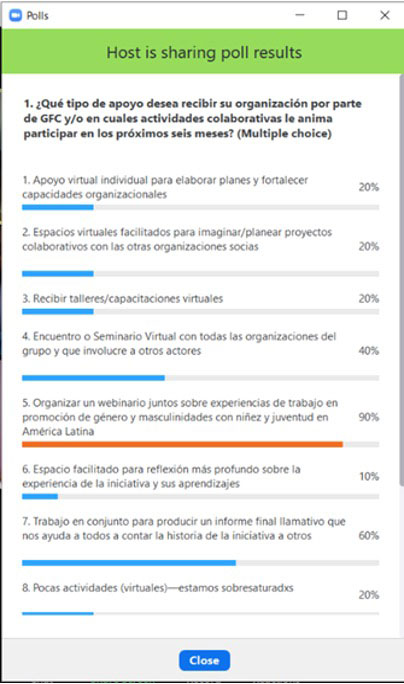 We realized that the activities we had planned before the pandemic – capacity assessment workshops, restricted organizational development grants, and a final convening – were primarily designed to demonstrate the initiative’s progress in our final report for Summit. Even done virtually, these activities would require our partners’ time and energy.
We realized that the activities we had planned before the pandemic – capacity assessment workshops, restricted organizational development grants, and a final convening – were primarily designed to demonstrate the initiative’s progress in our final report for Summit. Even done virtually, these activities would require our partners’ time and energy.
Meanwhile, the pandemic was demanding endless unpaid time and energy be spent on worrying, homeschooling, caring for sick loved ones, and weaving community safety nets. It threw a spotlight on the invisible strings often attached even to our flexible grants: you can do what you like with the money, but we will make demands on your time.
With Summit’s bold decision not to insist we spend time measuring, reporting, and proving, we also needed to stop making this demand of our partners. We wiped our project plan clean and asked our partners how they wanted to engage going forward. A poll over a Zoom call quickly gave us an answer.
The overwhelming majority wanted to organize a webinar to share their experiences engaging with children and youth. In second place was creating a visually pleasing final report that could inspire future funding. By suspending our own agenda, we were able to hear our partners’ priorities.
Irma González Neri, Executive Director, Center for Integrated Care for Women (CIAM) Cancún
(Translated from Spanish)
The meeting with GFC was a surprise. We didn’t expect that a final report or closing activity would be optional. This is unusual for a foundation, but it speaks to the confidence that GFC has in its partners. We saw the opportunity to share the achievements of the initiative widely during this time when there is a greater openness to digital media, including webinars. It’s important to capture the success of our programs in this watershed year, since the new normal will bring many changes in how we carry out activities.
We also had some sense that additional support like an organizational development grant was coming, and so it gave us great joy to learn that we could count on one last grant from GFC that was entirely flexible and available earlier in the year than usual. The flexibility of the grant,
which in previous years we had spent on in-school programming, allows us to pay stipends to our technical team and strengthen fundraising activities that will generate more unrestricted funds. Above all, it helps us respond to the new needs of the population we serve, such as emotional support. In this year of uncertainty, having this flexible budget commitment allows us all to breathe easier.
We have received a lot of support from all of the foundations with which we partner, including direct psychosocial assistance for our team, flexibility in the use of grants, deferral of reports, access to training, and emergency funds. The entire CIAM team has felt the empathy demonstrated by these actions. This empathy and trust have created a firm foundation for truly powerful support, not only in this time of crisis, but onwards in this perpetually complex and unpredictable world.
Will you add your voice to the narrative?
In their recent report Shifting Practices, Sharing Power?, the Council on Foundations found that more than 85% of respondents are adopting flexible grantmaking practices for their existing grantees. How has your organization leaned toward trust and flexibility during this time of upheaval? How might we all “choose well,” in the words of Archbishop Desmond Tutu, in the same way once the crisis subsides?
Header photo: GFC and its partners show off their goofy side in a group photo at the end of a planning meeting. © Global Fund for Children
